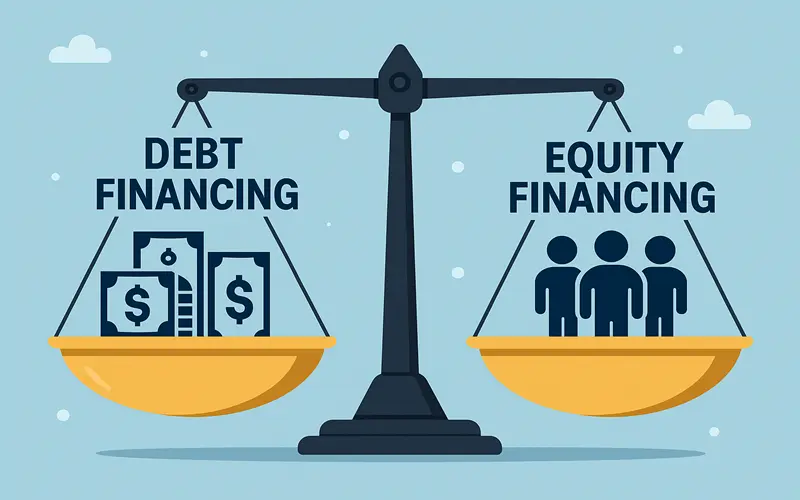Starting or growing a business can be exciting. But to make your dream come true, you often need money. Where do you get that money? That’s where debt vs equity financing comes in. These are two common ways to get funds for your business. Each method has its benefits and risks. Understanding both can help you choose the best option for your needs.
What Is Debt Financing?
Debt financing means borrowing money that you’ll have to pay back. It’s like taking a loan. You might borrow money from a bank, credit union, or even a private lender. In return, you agree to pay back the amount with interest over time.
Read More: money6x.com real estate
Common Examples of Debt Financing:
-
Bank loans
-
Business lines of credit
-
Bonds
-
Credit cards
Pros of Debt Financing:
-
You Keep Ownership: The lender doesn’t own part of your business. You stay in control.
-
Tax Benefits: Interest payments are often tax-deductible.
-
Predictable Payments: You know how much you need to repay and when.
Cons of Debt Financing:
-
Repayment Pressure: You must repay the money even if your business doesn’t earn profit.
-
Interest Costs: Loans can come with high interest.
-
Impact on Credit: Missing payments can hurt your credit score.
What Is Equity Financing?
Equity financing means getting money by giving up a share of your business. Investors give you cash, and in return, they become part-owners. You don’t have to pay this money back, but you do share profits and decisions.
Common Examples of Equity Financing:
-
Angel investors
-
Venture capital firms
-
Selling shares to the public (like in the stock market)
Pros of Equity Financing:
-
No Repayment: You don’t have to repay the money if the business doesn’t make profits.
-
Support and Advice: Investors often help with guidance, networks, and experience.
-
Less Pressure: You can focus on growing the business without worrying about loan payments.
Cons of Equity Financing:
-
Sharing Ownership: You give up part of your business.
-
Less Control: Investors may want a say in big decisions.
-
Sharing Profits: You may have to share earnings even when business is doing great.
Key Differences in Debt vs Equity Financing
Let’s look at the main differences side by side:
| Factor | Debt Financing | Equity Financing |
|---|---|---|
| Repayment | Yes, with interest | No repayment needed |
| Ownership | You keep full ownership | You give up part of your business |
| Control | Full control remains with you | Shared control with investors |
| Risk | Higher financial risk (due to repayments) | Lower financial risk (but you share gains) |
| Cost over time | Can be high if interest rates are high | Can be costly in profits shared long-term |
Which Option Is Best for You?
Choosing between debt vs equity financing depends on your business goals, financial situation, and risk comfort. Here’s how to think about it:
Choose Debt Financing If:
-
You want to keep full ownership.
-
Your business has steady income to repay the loan.
-
You only need a small to medium amount of money.
-
You have a strong credit history.
Choose Equity Financing If:
-
Your business is new and risky.
-
You need a large amount of capital.
-
You’re okay with sharing control and profits.
-
You want expert help from investors.
How Investors and Lenders Think
Understanding what investors and lenders want can help you prepare.
Lenders Want:
-
A clear plan to repay the loan
-
Good credit history
-
Assets to use as security
-
Strong cash flow
Investors Want:
-
A growing market
-
Unique business idea
-
Passionate team
-
Chance to earn high profits later
When comparing debt vs equity financing, think about how these choices affect your business in the long run.
Real-Life Example: Starting a Coffee Shop
Let’s say you want to open a coffee shop. You need $100,000.
If You Choose Debt:
You take a bank loan of $100,000. You agree to pay it back in 5 years with 5% interest. You still own 100% of the coffee shop, but must make monthly payments.
If You Choose Equity:
You find an investor who gives you $100,000 in exchange for 30% of your business. You don’t have to repay the money. But now, the investor owns part of your business and shares your profits.
Both options have pros and cons. That’s why it’s important to know what fits your situation better.
Blending Debt and Equity
Some businesses use both debt and equity financing. This is called hybrid financing. You get some benefits from each and spread out the risk.
Example:
You raise $60,000 from an investor (equity) and borrow $40,000 from the bank (debt). You only need to repay part of the money, and you still own most of your business.
This mix can be smart if done carefully. Always talk to a financial expert before deciding.
Important Things to Consider
Before choosing between debt vs equity financing, ask yourself:
-
How much money do I need?
-
Can I afford regular repayments?
-
Do I want full control over my business?
-
Am I okay sharing profits?
-
How fast do I plan to grow?
Also, take time to understand the terms of any deal. Whether it’s a loan or an investor agreement, read everything carefully.
Common Mistakes to Avoid
-
Borrowing Too Much: Don’t take more debt than you can repay.
-
Giving Away Too Much Equity: Think long-term before giving big ownership shares.
-
Not Understanding Terms: Always read the fine print.
-
Ignoring Hidden Costs: Interest, fees, or investor expectations can add up.
-
Rushing the Decision: Take your time. Get advice if needed.
Final Thoughts
Choosing between debt vs equity financing is a big step for any business. Both can help you succeed, but in different ways. Debt lets you keep control but adds pressure to repay. Equity gives you support without repayment, but you share ownership.
Think about your goals, your comfort with risk, and your ability to repay. And remember, sometimes a mix of both may be the best answer.
The more you understand your options, the better decisions you can make for your business success.
FAQs
1. What is the main difference between debt vs equity financing?
Debt financing is when you borrow money and must pay it back with interest. Equity financing is when you get money in exchange for part ownership of your business.
2. Which financing option is safer for a new business?
For new businesses, equity financing is often safer because you don’t have to repay the money if your business doesn’t earn profits. But it also means sharing control and profits.
3. Can I use both debt and equity financing?
Yes, many businesses use a mix of both. It’s called hybrid financing and helps balance the benefits and risks of each method.
Read More: wheonx.com

